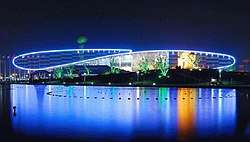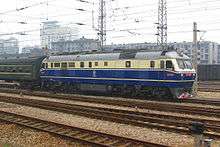Bengbu
Bengbu (Chinese: 蚌埠; pinyin: Bèngbù; Wade–Giles: Peng-pu) is a city in northern Anhui Province, China. Its metropolitan area consists of four urban districts, and has nearly one million residents, though the Prefecture-level city under its jurisdiction had 3,164,467 registered residents at the 2010 census. Its name means "Oyster Wharf" in Chinese, echoing its former reputation as a freshwater pearl fishery.
Bengbu 蚌埠市 Pengpu | |
|---|---|
 | |
| Nickname(s): Pearl city (珠城) | |
.png) Location of Bengbu City jurisdiction in Anhui | |
| Coordinates (Bengbu municipal government): 32°55′01″N 117°23′20″E | |
| Country | People's Republic of China |
| Province | Anhui |
| County-level divisions | 7 |
| Township-level divisions | 74 |
| Municipal seat | Longzihu District |
| Government | |
| • Mayor | Zhou Chunyu (周春雨) |
| • secretary of municipal Party committee | Chen Qitao (陈启涛) |
| Area | |
| • Prefecture-level city | 5,952.14 km2 (2,298.13 sq mi) |
| • Urban | 613.7 km2 (237.0 sq mi) |
| • Metro | 613.7 km2 (237.0 sq mi) |
| Population (2010 census) | |
| • Prefecture-level city | 3,164,467 |
| • Density | 530/km2 (1,400/sq mi) |
| • Urban | 972,784 |
| • Urban density | 1,600/km2 (4,100/sq mi) |
| • Metro | 972,784 |
| • Metro density | 1,600/km2 (4,100/sq mi) |
| Time zone | UTC+8 (CST) |
| Postal code | 233000 |
| Area code(s) | 0552 |
| ISO 3166 code | CN-AH-03 |
| License Plate Prefix | 皖C |
| Website | www |
Administration
The prefecture-level city of Bengbu administers seven county-level divisions, including four districts and three counties.
| Map | |||||
|---|---|---|---|---|---|
| Name | Chinese | Hanyu Pinyin | Post Code | ||
| Longzihu District | 龙子湖区 | Lóngzǐhú Qū | 233000 | ||
| Bengshan District | 蚌山区 | Bèngshān Qū | 233000 | ||
| Yuhui District | 禹会区 | Yǔhuì Qū | 233000 | ||
| Huaishang District | 淮上区 | Huáishàng Qū | 233000 | ||
| Huaiyuan County | 怀远县 | Huáiyuǎn Xiàn | 233400 | ||
| Wuhe County | 五河县 | Wǔhé Xiàn | 233300 | ||
| Guzhen County | 固镇县 | Gùzhèn Xiàn | 233700 | ||
These are further divided into 74 township-level divisions, including 36 towns, 19 townships and 19 subdistricts.
Geography
Bengbu is located in the southeast of the North China Plain, on the Huai River. The built up urbanized area is divided into two parts: greater Bengbu on the south bank of the river and little Bengbu on the north bank. Dragon Lake is on the East side of the urbanized area. On the other side of the lake is the university district, containing four institutions of higher learning.
Climate
The area has a four-season humid subtropical climate with strong monsoon influences (Köppen climate classification Cwa), cool, sometimes cold, winters, and hot and humid summers. The area lies in a climatic transition zone, as it is on the Qin Ling−Huai River boundary between the climatic regimes of northern and southern China. The monthly 24-hour average temperature ranges from 2.0 °C (35.6 °F) in January to 28.1 °C (82.6 °F) in July, and the annual mean is 15.76 °C (60.4 °F). A majority of the annual precipitation occurs from June to August. With monthly percent possible sunshine ranging from 44% in March to 56% in August, the city receives 2,168 hours of bright sunshine annually.
| Climate data for Bengbu (1981−2010 normals) | |||||||||||||
|---|---|---|---|---|---|---|---|---|---|---|---|---|---|
| Month | Jan | Feb | Mar | Apr | May | Jun | Jul | Aug | Sep | Oct | Nov | Dec | Year |
| Record high °C (°F) | 21.3 (70.3) |
25.7 (78.3) |
30.9 (87.6) |
35.2 (95.4) |
37.6 (99.7) |
40.7 (105.3) |
40.3 (104.5) |
41.3 (106.3) |
38.5 (101.3) |
34.4 (93.9) |
29.8 (85.6) |
22.6 (72.7) |
41.3 (106.3) |
| Average high °C (°F) | 6.5 (43.7) |
9.1 (48.4) |
14.3 (57.7) |
21.3 (70.3) |
26.8 (80.2) |
30.3 (86.5) |
32.1 (89.8) |
31.3 (88.3) |
27.4 (81.3) |
22.4 (72.3) |
15.7 (60.3) |
9.2 (48.6) |
20.5 (68.9) |
| Daily mean °C (°F) | 2.0 (35.6) |
4.5 (40.1) |
9.3 (48.7) |
16.0 (60.8) |
21.5 (70.7) |
25.5 (77.9) |
28.1 (82.6) |
27.2 (81.0) |
22.9 (73.2) |
17.3 (63.1) |
10.5 (50.9) |
4.3 (39.7) |
15.8 (60.4) |
| Average low °C (°F) | −1.4 (29.5) |
0.9 (33.6) |
5.1 (41.2) |
11.3 (52.3) |
16.8 (62.2) |
21.3 (70.3) |
24.8 (76.6) |
24.0 (75.2) |
19.3 (66.7) |
13.3 (55.9) |
6.4 (43.5) |
0.7 (33.3) |
11.9 (53.4) |
| Record low °C (°F) | −19.3 (−2.7) |
−19.4 (−2.9) |
−9.4 (15.1) |
−1.4 (29.5) |
3.7 (38.7) |
12.0 (53.6) |
16.8 (62.2) |
15.0 (59.0) |
8.7 (47.7) |
−0.5 (31.1) |
−7.1 (19.2) |
−13.3 (8.1) |
−19.4 (−2.9) |
| Average precipitation mm (inches) | 29.3 (1.15) |
36.8 (1.45) |
57.0 (2.24) |
50.9 (2.00) |
76.3 (3.00) |
127.8 (5.03) |
243.8 (9.60) |
139.1 (5.48) |
85.9 (3.38) |
51.6 (2.03) |
46.0 (1.81) |
21.3 (0.84) |
965.8 (38.01) |
| Average precipitation days (≥ 0.1 mm) | 5.9 | 7.4 | 9.9 | 8.6 | 9.3 | 10.3 | 13.8 | 10.2 | 8.2 | 7.6 | 6.6 | 5.0 | 102.8 |
| Average relative humidity (%) | 71 | 70 | 69 | 67 | 68 | 71 | 79 | 80 | 76 | 71 | 70 | 69 | 72 |
| Mean monthly sunshine hours | 146.8 | 142.5 | 162.1 | 177.0 | 202.5 | 214.8 | 208.7 | 232.4 | 175.8 | 190.6 | 161.6 | 152.7 | 2,167.5 |
| Percent possible sunshine | 46 | 46 | 44 | 45 | 48 | 50 | 48 | 56 | 48 | 54 | 52 | 50 | 49 |
| Source 1: China Meteorological Administration (precipitation days 1971–2000)[1][2] | |||||||||||||
| Source 2: 富农路蚌埠农业投资频道 (sunshine 1971–2000)[3] | |||||||||||||
History
In ancient times, the Dongyi peoples inhabited this area and were collectively known as the Huaiyi after the Huai River. During the late Western Zhou Period and the early Spring and Autumn period, the Dongyi became increasingly sinicized. During the late Spring and Autumn period, the once-powerful Dongyi state of Xu was pressured from all directions and destroyed through a series of wars with its neighbors, such as the Chu State and the Wu State. Another Dongyi State was the small Zhongli State, which was a part of the Huaiyi Confederation led by the State of Xu. Tombs belonging to the royalty of the Zhongli State were discovered in excavations between 2005 and 2008 near Fengyang. Eventually, the Huaiyi peoples were either pushed south or assimilated.
Bengbu has always been a hub of water and land communications in Anhui province, and a major distribution centre for the Huai basin.
In 1948, during the Chinese Civil War, the Communist People's Liberation Army won a decisive victory over Chiang Kai-shek's Nationalist (KMT) forces near Bengbu, in the Huaihai Campaign.
Economy
Industry
Bengbu is now a famous food city in Anhui province. Food-related industries account for 44% of the city's industrial production. The city's other industries include engineering works, textiles, glass making, chemicals, and electronics. The light textile holds an important position in the industrial structure.
Agriculture
Bengbu is teeming with oil, vegetables, meat and aquatic products. Bengbu is a large producer of peanuts. The pomegranates from Huaiyuan (a county of Bengbu), have a high reputation in China. In Wuhe (a county of Bengbu), the crabs are also famous.
Culture
Pollution in the village of Qiugang, a suburb of Bengbu, was the subject of the 2010 film The Warriors of Qiugang, an 83rd Academy Awards nominee.
Food
Bengbu cuisine, along with northern Anhui cuisine, is similar to cuisine from nearby Henan and Shandong provinces, as well as Xuzhou cuisine in northern Jiangsu province.
Transportation

The city is on the Jinghu Railway, with hourly direct trains to Beijing, Shanghai and other large cities. Bengbu South Railway Station is served by the high-speed Beijing-Shanghai Railway.
Bengbu Airport, which was relocated from the city's central urban area around the turn of the 21st century, is now operated only as a military airport. A new commercial airport is under construction in the district north of the Huai river.
Construction on the Bengbu Metro started in 2019 and is due to be completed in 2023.
Colleges and universities
- Anhui University of Finance and Economics
- Bengbu Medical College
- Bengbu College
- Bengbu Tank College (Army)
- Thirteenth Flying Academy (Air Force)
Twinnings



References
- 中国气象数据网 - WeatherBk Data (in Chinese). China Meteorological Administration. Retrieved 2020-04-15.
- 中国地面国际交换站气候标准值月值数据集(1971-2000年). China Meteorological Administration. Archived from the original on 2013-09-21. Retrieved 2010-05-25.
- 日照时数. Archived from the original on 2011-07-11. Retrieved 2010-06-20.
External links
- Government website of Bengbu (in Simplified Chinese)
